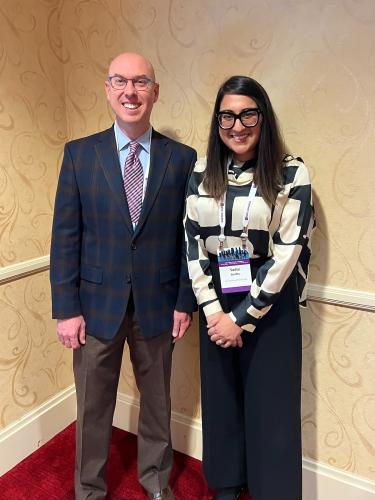
Winners of the sixth annual George V. Voinovich Public Innovation Challenge announced

The sixth annual George V. Voinovich Public Innovation Challenge, which encourages faculty and staff to submit applications describing their innovative approaches to enhancing students’ education, addressing unmet needs, advancing understanding of their field, or improving programmatic effectiveness, announced this year’s winners.
The winners include Sadia Sindhu from the Harris School of Public Policy at the University of Chicago who won first place, Judith Kelley from the Sanford School of Public Policy at Duke University who earned second place, and Jennifer Niggemeier from the Ford School of Public Policy at the University of Michigan, who scored third place.
The sixth annual challenge, which is co-sponsored by the Voinovich School of Leadership and Public Service at Ohio University and the Network of Schools of Public Policy, Affairs, and Administration (NASPAA), invited all NASPAA member institutions to pitch their programs and strategies that demonstrate innovative approaches to applied learning or executive education.
Kate Leeman, director of strategic initiatives at the Voinovich School, said the annual challenge was inspired by Senator Voinovich, honoring his innovative approach to public service.
“The purpose of it is to encourage and highlight innovation in public administration programs,” Leeman said. “This year, we decided that we really wanted to focus on schools that were figuring out creative new ways to offer executive education or applied learning experiences to public administration students.”
The challenge brought 17 applicants, which were narrowed down to four finalists who pitched their innovative ideas during NASPAA’s 2022 annual conference in Chicago, Ill.
Sindhu presented on the Civic Leadership Academy (CLA), a program of the Center for Effective Government (CEG), housed at the University of Chicago’s Harris School of Public Policy. The Voinovich School awarded CLA’s initiatives, offering Sindhu first place and top prize of $10,000 to support CLA’s work in executive education.
Sindhu, who serves as the executive director for CEG, submitted her proposal highlighting the CLA program and its impact. She described CLA as a six-month leadership development program intended to invest deeply in the city’s civic infrastructure and to address the leadership gap in the public sector.
“The program itself is designed to bring forth people who are on opposite ends of the negotiating table together,” Sindhu said. “We're thinking broadly about institutional reform, and collectively reimagining our democracy.”
Upon receiving the top prize for the CLA initiative, Sindhu said she was “pleasantly surprised and delighted” to see the program recognized in this way.
“This is hard work when you're trying to have difficult conversations about police reform, or criminal justice reform or rethinking the structure of the city council,” Sindhu said. “We're adding an additional degree of complexity to that work. So, it was very wonderful to see that that was attractive to the judges.”
Voinovich School’s MPA Director, Jason Jolley, who also convened the event, reflected on the fulfilling aspect of the challenge.
“It's always inspiring to see people who have figured out a creative new way to approach education for the public sector leaders of tomorrow,” Jolley said.
Past winners have included:
- The NextGen Leadership Program at the University of Nebraska at Omaha where aspiring leaders learn specific techniques regarding collaboration and leadership through hands-on projects.
- The O'Neill School of Public and Environmental Affairs at Indiana University – Purdue University Indianapolis (IUPUI) and the University of Miami for the "COVID-19 Executive Orders Project," a tool to examine and analyze pandemic-related executive orders adopted at state levels and present them in a dashboard for comparison.
- The University of Maryland’s Do Good Campus which seeks to make social impact education a core element of all students' experiences, from orientation to graduation. Schools across campus partner to develop social impact courses, and students compete in a year-long Do Good Campus competition.
- The University of Kansas’ Pathways to Public Service, which provides community college students with a seamless transition to a KU bachelors program through a combination of academic and financial coaching, social meet-ups, networking events, and leadership opportunities.
- The University of Montana’s Robotic MPA Access, which enables online students to fully participate in on-site classes via robot, including participating in live discussions, engaging with classmates, and moving around the room.
